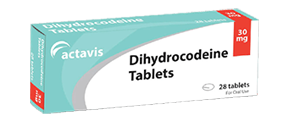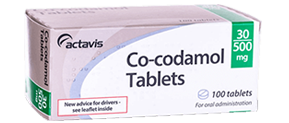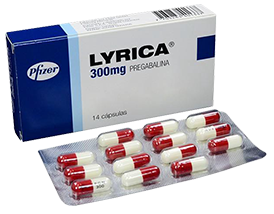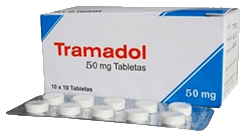 USD -
( $
)
USD -
( $
) GBP -
( £ )
GBP -
( £ ) EUR
- ( € )
EUR
- ( € ) BTC -
( )
BTC -
( )
- 0 Cart

Get 10% off on every order!
Dihydrocodeine 30mg tablets are used for treating moderate pain. They help reduce pain signals and offer long-lasting relief for injuries, surgeries, or chronic conditions.
Dihydrocodeine is a synthetic opioid analgesic that is derived from Codeine. This medicine is most prescribed for mild to severe pain treatment such as postoperative. Dihydrocodeine is also effective in reducing your cough and pain associated with shortness of breath. Doses for mild to moderate pain is 15 mg-30 mg while controlled release versions are also available that contain 60 mg-120 mg.
As an analgesic with medium to extreme pain relief, Dihydrocodein 30 mg tablets are suggested in all patient pain conditions, e.g. sciatica, osteoarthritis, chronic arthritis rheumatoid, spinal arthritis, peripheral vascular disorder, postherpetic neuralgia, Paget's disease, malignancy, postoperative pain. Due to the low or no respiratory failure of Dihydrocodeine in the prescribed doses, its use in postoperative pain can reduce the risk of these complications.
This formulation is used to relieve mild discomfort, fever and swelling. The opioid painkiller operates in certain brain regions to alleviate pain. Aspirin prevents discomfort, fever and swelling. Caffeine tends to improve aspirin's pain effects.
If accessible from your pharmacist before you decide to take dihydrocodeine dosage and each time you get a refill, read the Medication Guide. Take a full glass of water (8 ounces or 240 millilitres) except as instructed by the doctor. Do not lay down after taking this drug for at least 10 minutes. You can take this medicine with food if you have nausea. Consult the doctor or pharmacist on other ways to alleviate nausea (for example, sleep as little as practicable for 1-2 hours without much head movement).
The dose is dependent on the current condition and medication reaction. Do not increase or use your dosage more frequently or longer than prescribed, as your risk of side effects can grow. If so guided, stop this product properly. Pain medicines are best taken as the initial signs of pain. It will not work as well if you delay until the problem has intensified.
Stopping dihydrocodeine 30mg suddenly can trigger withdrawal, especially if you have taken it for a long time or at large doses. Your doctor can steadily lower your quantity to avoid withdrawal. Tell the medical practitioner or pharmacist promptly if you encounter symptoms of withdrawal such as restlessness, shifts of attitude (include fear, sleeping problems, suicidal thoughts), watering of the eyes, running nose, fatigue, diarrhoea, sweating, stomach aches or unexpected behavioural adjustments.
Dihydrocodeine tablets are an opioid (also referred to as opiate) drug. It is used for the management of mild to extreme pain levels. It functions by connecting to some small regions of the central nervous system, called opioid receptors (brain and spinal cord). This contributes to a decline in the sensation of discomfort and discomfort response. Dihydrocodeine is available with a doctor's prescription.
Dihydrocodeine acts by preventing pain impulses travelling to the brain via the nerves. The regular tablets for Dihydrocodeine require 1,5 to 2 hours to function completely.
Immediate Release Tablets
For adults and children 12 years and older, the usual dosage is:
For adults and children 12 years and older, the usual dosage is:
There are certain conditions in which Dihydrocodeine should not be used. Before you buy Dihydrocodeine, don't forget to read these tips for better results.
Alcohol When you consume Dihydrocodeine you should not drink alcohol. Dihydrocodeine raises the likelihood of adverse effects from alcohol, like becoming dizzy and tired.
Please be mindful that Dihydrocodeine will influence your reactions and driving abilities if you're a driver. It's a crime to go as the actions are affected. And if your drive capacity is not compromised, you can bring any documentation that the drug has been administered for you - it is usually thought acceptable to provide a repeat medication form or a medical information brochure.
Dihydrocodeine dosage is not provided for longer than is required. That's because when you repeatedly take Dihydrocodeine and then avoid taking it, it may induce withdrawal symptoms, such as restlessness or irritability. Your doctor will prescribe reducing the dosage progressively to reduce the chance of these symptoms if you take it for a while and choose to quit it.
This depends on the type of dihydrocodeine tablets you take. If you fail to take a dose, consult the patient details leaflet inside the kit or ask a doctor or pharmacist for guidance about what to do. Never take two doses together to cover for one forgotten. If you sometimes skip doses, it will help to warn you of a warning. You can also seek guidance from a pharmacist for other approaches to remember to take the medication.
Though it may be uncommon, it could be quite dangerous and sometimes tragic for certain people to take medication. Tell the doctor or seek medical attention promptly if you experience either of the following symptoms or indications that may be linked with a potentially severe side effect. Below are a few of the dihydrocodeine side effects.
Allergic response symptoms such as rash: hives; itching; redness, bruised, blistered, or skin even without fibre; wheezing; chest or throat closed, discomfort coughing, swallowing or speaking; unusual heartburn; or mouth, ears, lips, tongue, or throat swelling.
Signs of kidney issues such as urinary malfunction, variations in urinary passage, blood in urine, or substantial weight increase. High-level potassium symptoms, such as a heart-beat that may not sound normal; confused; sluggish, lightheaded or dizzy; a sense of disappearance; tingling or numbness; or shortness of breath.
Some Other Side Effects
Keep all the side effects in mind before you buy Dihydrocodeine UK.
Last Reviewed: 10th September 2025
Next Review Due: October 2026

Co-Codamol 30/500mg is used to treat severe pain that is not relieved by other painkillers. This dose may be taken, up to 4 times a day at intervals of not less than 6 hours.
View Treatment
Pregabalin also called anticonvulsant works by slowing down impulses in the brain that cause seizures. This medicine is incredibly useful for people with chronic neuropathic pain.
View Treatment
Tramadol is an oral medication which is generally prescribed to help relieve ongoing moderate to severe pain. This medicine works in the brain to change how your body feels and respond to the pain.
View TreatmentDihydrocodeine is an opioid analgesic that may be used to relieve mild to extreme discomfort, dyspnea and cough as an adjunct or in addition to codeine. It is semi-synthetic and was developed in 1908 in Germany to find an efficient antitussive agent for reducing the spread of infectious diseases in the air, such as tuberculosis, during an international study. It was first sold in 1911. It releases some brain chemicals that directly work on easing the chemical imbalances in CNS, thus leading to a reduction of pain.
Dihydrocodeine is a painkiller opiate. It is used to relieve mild to severe pain, for example, following surgery or serious injury. It is often used in long-term suffering where weaker painkillers, including acetaminophen, ibuprofen and aspirin, do not perform. It is sometimes blended with paracetamol, classified as co-dydramol. They are available as regular pills, slow-release pills and liquid you swallow. It may also be given in the muscle or below the skin through injection. Typically this is performed in the hospital.
Tip: It is highly recommended to buy Dihydrocodeine online only after your doctor's consultation.
The pain medication requires about 20 minutes to 30 minutes to start functioning, although it requires up to 1 Hour to have the maximum effect. Long-acting provisions steadily release over 12 hours.
It is not normally advised to use Dihydrocodeine all through pregnancy or breastfeeding. You should take safer drugs - consult a doctor or pharmacist. This medicine is related to certain complications for your baby during early pregnancy. If you take Dihydrocodeine towards the end of the pregnancy, you risk experiencing signs of withdrawal or Dihydrocodeine abuse after you are born. However, managing pain during pregnancy is critical. Dihydrocodeine could be the best treatment for certain pregnant women with extreme pain. Your doctor is the perfect one for you and your baby to determine what is right. To prevent Dihydrocodeine side effects, try to stick to the doctor's recommendations.
Typically, if you take a painkiller which can be obtained through the counter like paracetamol or ibuprofen, it is safe to consume a small amount of alcohol (not higher than the alcohol guideline) if you have relevant guidance. When you take a prescription-only pain reliever, including tramadol or codeine, it is not advised to consume alcohol. It might raise adverse effects such as somnolence.
As per the experts below are a few conditions in which it's always better not to buy Dihydrocodeine online check the list:
Some drugs are not appropriate for patients with certain illnesses, and only when additional caution is taken may sometimes be used. For these factors, your doctor needs to know before you start taking Dihydrocodeine:
Dihydrocodeine can only ever be purchased with a doctor's prescription. You can buy this drug from a pharmacy with a prescription. Or you can buy Dihydrocodeine online after you upload the prescription.